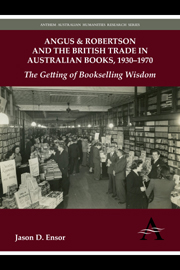 Angus & Robertson and the British Trade in Australian Books, 1930–1970
Angus & Robertson and the British Trade in Australian Books, 1930–1970 Published online by Cambridge University Press: 05 July 2013
British strategies in establishing overseas branches … Phase 1: A representative of a publisher visits a country and assesses its possibilities. Where development seems possible, he sets up a resident agent working on a commission basis. Sometimes, the agent will be shared by other firms; sometimes a local wholesaler will act as agent.
Whatever might be said about the national and cultural significance of the circulation of printed products, witnesses for the 1930 Tariff Board Inquiry were essentially engaged in a debate about the proper economic balance between home and overseas (imported) books. At stake from their perspective as printers, booksellers and publishers was the best strategy for securing interest in locally manufactured products within a book trade dominated by international publishers whose business practices often enriched the sale of overseas books at the expense of Australian-made books. One solution, put forward by James Howard Catts, was the call for a tariff or a duty that would severely limit the importation of books into Australia. But, as other witnesses of the inquiry revealed, to restrict overseas books by way of an economic penalty at the border posed some challenges for the Australian book trade that could not be easily resolved.
To save this book to your Kindle, first ensure [email protected] is added to your Approved Personal Document E-mail List under your Personal Document Settings on the Manage Your Content and Devices page of your Amazon account. Then enter the ‘name’ part of your Kindle email address below. Find out more about saving to your Kindle.
Note you can select to save to either the @free.kindle.com or @kindle.com variations. ‘@free.kindle.com’ emails are free but can only be saved to your device when it is connected to wi-fi. ‘@kindle.com’ emails can be delivered even when you are not connected to wi-fi, but note that service fees apply.
Find out more about the Kindle Personal Document Service.
To save content items to your account, please confirm that you agree to abide by our usage policies. If this is the first time you use this feature, you will be asked to authorise Cambridge Core to connect with your account. Find out more about saving content to Dropbox.
To save content items to your account, please confirm that you agree to abide by our usage policies. If this is the first time you use this feature, you will be asked to authorise Cambridge Core to connect with your account. Find out more about saving content to Google Drive.